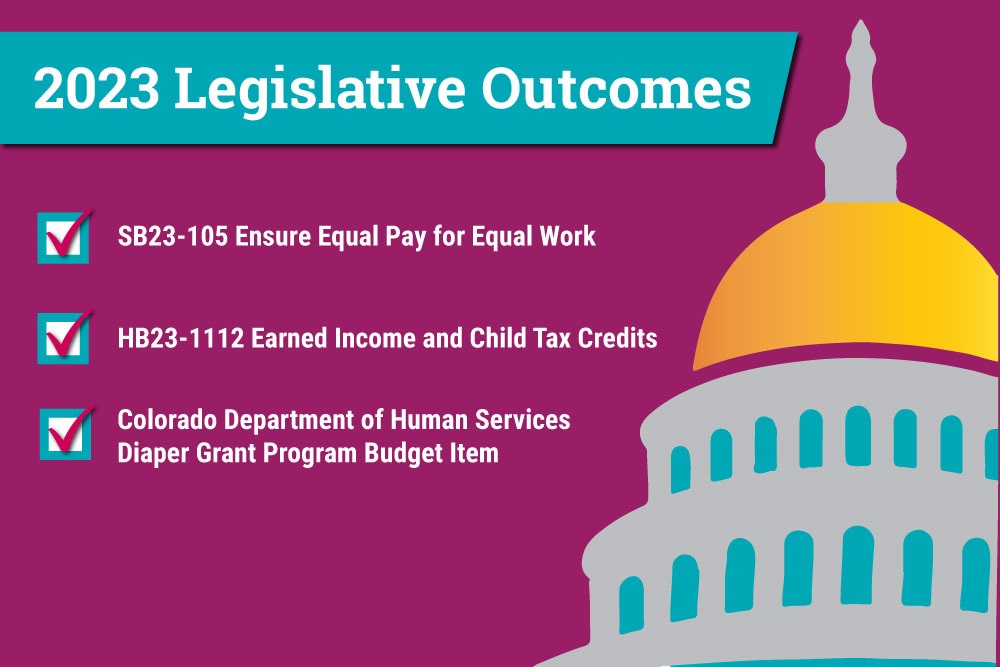
2023 Legislative Session: Some Progress to Celebrate, But Opportunities Remain
What Measures Passed and Why Do They Matter?
Access to Equal Pay, Diaper Distribution Program, and Tax Credits Headline the Wins for Women
WFCO’s top three priorities that we allocated lobbying resources to – ensuring access to equal pay, continuation of a diaper distribution program, and the expansion of the earned income tax credit (EITC) and child tax credit – passed. Not only did we allocate lobbying resources to Ensure Equal Pay for Equal Work, we led a working coalition of organizations and individuals statewide to ensure the bill passed. But overall, Colorado could have done better for women. Opportunities were missed to protect low-wage workers, workers of color, and women through a fair workweek law, and to expand employment and training services for individuals who have been involved in the justice system or who are unemployed.
We celebrate the 21 successful bills that we actively and passively supported, but we know that so much opportunity remains for elected officials to advance gender, racial, and economic equity. Read more about our priority bills and the reproductive health care package that continues to affirm Colorado as a refuge for people in other parts of the country governed by laws that limit when they can terminate pregnancies or transition their genders.
SB23-105: Ensure Equal Pay for Equal Work
What the bill does: The bill for which WFCO led a working coalition of organizations and individuals to help pass, strengthens the trailblazing Equal Pay for Equal Work Act passed in Colorado in 2019 that sparked a national movement toward pay transparency. Now, 1 in 4 workers in the country are covered by a pay transparency law.
Why it matters: If a woman believes she has not received equal pay but cannot afford legal support, the Colorado Department of Labor and Employment will be able to investigate and enforce equal pay requirements as well as offer mediation services to resolve claims. Next, if it is found that she received unequal pay, it will extend the back pay period up to six years from three years, so that a woman can recover the difference between what she was paid and what she should have been paid for as long as she was underpaid – up to six years. Lastly, it updates and clarifies pay transparency requirements for employers, making it easier for them to comply and improving workers’ access to information about advancement pathways and job opportunities.
Colorado Department of Human Services Diaper Distribution Program
What the bill does: Already signed into law by Gov. Polis as part of the state’s budget for next fiscal year, the act will put diapers in the hands of families who need them. It does this by continuing funding of the diaper distribution program that was passed in 2021.
Why it matters: According to a recent PBS news story, the high cost of diapers is an often invisible part of poverty in America. Although 5 million babies and toddlers in the U.S. live in poverty, most government programs do not provide diapers or funding to purchase them. And just like most basic needs, the cost of diapers keep rising and will increase again in 2023.
HB 23-1112: Earned Income and Child Tax Credits
What the bill does: This bill will expand the state’s earned income tax credit percentage of the federal for the tax year 2024 and permanently remove the income and phase-in requirement for the state child tax credit. Families with no or low income, those filing between $0 and $25,000, will receive $1,200 per qualifying child starting in the tax year 2024. Under HB 23-1112, the estimated average EITC for all eligible claimants is $834, and the estimated average tax credit for all eligible claimants is estimated to be $840.
Why it matters: Child tax credits cut the rate of child poverty – period. The 2021 expansion of the federal child tax credit led to a historic reduction in poverty in the U.S., with child poverty falling to its lowest level on record at 5.2%. Black child poverty rates fell by 17% between 2009 and 2021, while child poverty rates fell from 30% to 8% among Hispanic children over the same period.
Reproductive Health Care Package
- SB23-188: Protections for Accessing Reproductive Health Care
- SB23-189: Increasing Access to Reproductive Health Care
- SB23-190: Deceptive Trade Practice Pregnancy-Related Service
What these bills do: These bills will strengthen access to abortion and gender-affirming care in Colorado. Following the passage of the Reproductive Health Equity Act in 2022, these laws affirm Colorado as a refuge for people in other parts of the country governed by laws that limit when they can terminate pregnancies or transition their genders.
Why they matter: Reproductive health care is an essential component of primary and preventive care. Any restrictions upon the ability of individuals to get the health care they need are inconsistent with our Colorado values of individual liberty and self-determination.
Opportunities Remain
In the fall, voters will be faced with more ballot questions related to how our state can invest in people. We’ll offer events to help you understand how voters play a role in driving a more fair tax code to better meet the needs of the women who need access to opportunity.
Additionally, WFCO will be involved in the rule making process for the law to Ensure Equal Pay for Equal Work to make sure it is fully implemented. Your input could help form these rules. Please contact louisem@wfco.org if you’d like to get involved.
In the meantime, let’s celebrate the progress we’ve made this year. Please register for one of our two end-of-session celebrations on May 18 (virtual) and June 1 (in person at our offices).

